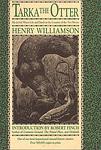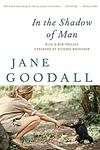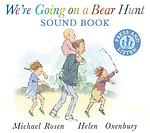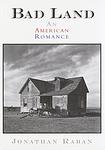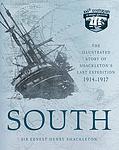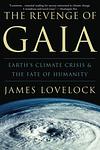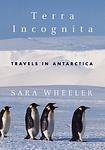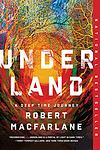The Greatest British "Nature & Environment" Books of All Time
Click to learn how this list is calculated.
This list represents a comprehensive and trusted collection of the greatest books. Developed through a specialized algorithm, it brings together 300 'best of' book lists to form a definitive guide to the world's most acclaimed books. For those interested in how these books are chosen, additional details can be found on the rankings page.
Genres
The "Nature & Environment" category encompasses a broad range of books that delve into the intricacies of the natural world and the complex relationship between humans and their environment. Titles within this genre may explore topics such as wildlife, ecosystems, conservation efforts, climate change, and sustainability. They can include scientific texts that provide in-depth analysis of environmental processes, as well as more narrative-driven works that aim to inspire appreciation and stewardship of nature through personal anecdotes, stunning photography, and explorations of the beauty and diversity of the Earth's flora and fauna. This category is designed for readers who are curious about the planet's natural wonders, concerned about environmental issues, and interested in learning about ways to protect and preserve the world for future generations. Whether through practical guides on living more sustainably or through compelling stories of outdoor adventure, books in the "Nature & Environment" genre aim to educate, inform, and sometimes mobilize readers to engage with the natural world around them.
Countries
Date Range
Reading Statistics
Click the button below to see how many of these books you've read!
Download
If you're interested in downloading this list as a CSV file for use in a spreadsheet application, you can easily do so by clicking the button below. Please note that to ensure a manageable file size and faster download, the CSV will include details for only the first 500 books.
Download-
1. Watership Down by Richard Adams
This novel follows a group of rabbits as they flee their warren due to a foreseen catastrophe. The rabbits, led by Hazel and his psychic brother Fiver, face numerous challenges and adventures as they search for a new home. They encounter predators, hostile rabbit communities, and human threats. The book explores themes of leadership, survival, and freedom, all set within the natural world and its inherent dangers.
-
2. On Liberty by John Stuart Mill
This influential philosophical work explores the concept of personal freedom and societal limits, arguing that individuals should have the right to act as they want, provided they do not harm others. The book elaborates on the nature and limits of the power that can be legitimately exercised by society over the individual, and champions individuality and nonconformity. It also discusses freedom of speech, asserting that all opinions should be openly expressed to prevent any single viewpoint from becoming dogma.
-
3. The Worst Journey in the World by Apsley Cherry-Garrard
"The Worst Journey in the World" is a gripping account of the Terra Nova Expedition to the South Pole in 1910-1913. The book vividly describes the perilous journey undertaken by a team of explorers, their struggles with brutal weather conditions, and the tragic loss of their leader and four other members on their return from the Pole. The narrative is not only about physical survival in harsh conditions, but also about the psychological toll of such an expedition, making it a timeless testament to human endurance and spirit.
-
4. The Voyage of the Beagle by Charles Darwin
This book is a vivid and exciting travel memoir as well as a detailed scientific field journal covering biology, geology, and anthropology that demonstrates the author’s keen powers of observation, written at a time when Western Europeans were still discovering and exploring much of the rest of the world. The author's five-year journey took him from the coasts of South America, Australia, and Africa to the South Pacific islands, during which he collected and documented the natural history of these areas. The voyage and the specimens he brought back would later form the basis for his famous theory of evolution.
-
5. Tarka the Otter by Henry Williamson
"Tarka the Otter" is a novel that follows the life of an otter, Tarka, in the wild. The story is set in North Devon, England and provides a detailed account of Tarka's experiences, from his birth to his eventual death, exploring his interactions with other animals, his struggles for survival, and his encounters with humans. The narrative is noted for its vivid and realistic descriptions of wildlife and the natural world.
-
6. The Natural History and Antiquities of Selborne by Gilbert White
"The Natural History and Antiquities of Selborne" is an exploration of the natural world in the English village of Selborne. The author, through a series of letters, provides detailed observations and insights into the flora, fauna, weather and geology of the area. The book also sheds light on the history and antiquities of the village, offering a comprehensive view of Selborne during the 18th century.
-
7. In the Shadow of Man by Jane Goodall
This book provides a fascinating and detailed account of the author's groundbreaking research on wild chimpanzees in Africa. The author offers insights into the complex social structure, behavior, and personalities of these primates, challenging the then-prevailing scientific belief that only humans were capable of having personalities and emotions. Through her studies, the author revolutionized our understanding of our closest relatives in the animal kingdom, and she also discusses the threats to their survival and the many challenges they face due to human activities.
-
8. We're Going on a Bear Hunt by Michael Rosen
This children's book is a captivating adventure story about a family that embarks on a playful and imaginative bear hunt. They overcome a series of obstacles along the way, such as long, wavy grass, a deep, cold river, and a swirling, whirling snowstorm. The family's hunt ends when they come face to face with an actual bear and have to rush back home. The narrative is filled with fun repetitive phrases and sound effects, making it an engaging read for young children.
-
9. Bad Land: An American Romance by Jonathan Raban
This book is a historical exploration of the American West, specifically the region of Eastern Montana. The author delves into the experiences of the British and Scandinavian settlers who were lured to this area in the early 20th century by railroad advertisements promising fertile farmland. Through a combination of historical research, personal narratives, and travelogue-style observations, the author paints a vivid picture of the harsh realities these settlers faced, including drought, isolation, and economic hardship. The book also reflects on the lasting impact of these experiences on the region's culture and identity.
-
10. H Is For Hawk by Helen MacDonald
"H Is For Hawk" is a memoir by Helen MacDonald about her experiences training a goshawk named Mabel after the sudden death of her father. MacDonald reflects on her grief and the challenges of training a wild bird while also delving into the history of falconry and the life of T.H. White, the author of "The Once and Future King" who also trained a goshawk. The book explores themes of loss, nature, and the complexities of human-animal relationships.
-
11. South by Ernest Shackleton
"South" is a gripping account of an ill-fated Antarctic expedition led by a brave explorer. The journey takes a disastrous turn when their ship gets trapped and eventually crushed by ice, forcing the crew to abandon ship and embark on a harrowing journey over sea and land in a desperate bid for survival. The book is a testament to the crew's indomitable spirit and the leadership that kept them alive against all odds.
-
12. Earth: An Intimate History by Richard Fortey
This book provides a comprehensive understanding of the Earth's geological history. The author explores how the planet's diverse landscapes were formed over billions of years, examining various regions around the world from Hawaii to the Alps. The narrative intertwines scientific theories with engaging storytelling, making complex geological concepts accessible to a general audience. The book also emphasizes the impact of geological forces on human history and culture.
-
13. The Revenge of Gaia by James Lovelock
The book presents a compelling argument about the Earth's self-regulating system, Gaia theory, and the severe impact of climate change on it. The author warns that if humans continue to harm the environment, Gaia will take revenge, leading to a much hotter and less hospitable planet. He proposes solutions to mitigate the damage, such as nuclear power and sustainable technology, emphasizing the urgency to act before it's too late.
-
14. Terra Incognita by Sara Wheeler
"Terra Incognita" is a detailed and personal account of the author's seven-month journey across Antarctica. The book combines historical research, scientific facts, and the author's personal experiences, providing an insightful look into the harsh and beautiful landscape of Antarctica. It explores the physical and emotional challenges faced by the author as well as the rich history and scientific discoveries associated with the continent.
-
15. Underland by Robert Macfarlane
"Underland" is a deep exploration into the world beneath our feet, taking readers on a journey into the Earth's underworlds. The book delves into the hidden landscapes of the subterranean, from the catacombs of Paris, the underground fungal networks in forests, to the deep sea caves and glacial crevasses. It beautifully combines natural history, mythology, and environmental science, while exploring themes of human impact on the planet, our relationship with darkness, and the concept of deep time.
-
16. Entangled Life by Merlin Sheldrake
"Entangled Life" explores the fascinating world of fungi and their intricate relationships with other organisms. From the underground networks that connect trees and plants to the role of fungi in shaping ecosystems, the book delves into the hidden realms of mycelium and its impact on our planet. With captivating storytelling and scientific insights, the author reveals the astonishing diversity and resilience of fungi, challenging our understanding of life itself.
-
17. The Wavewatcher's Companion by Gavin Pretor-Pinney
"The Wavewatcher's Companion" by Gavin Pretor-Pinney is a captivating exploration of waves in all their forms, from the crashing waves of the ocean to the invisible waves of sound and light. With a mix of scientific knowledge and poetic prose, the author takes readers on a journey through the fascinating world of waves, revealing their beauty, power, and influence on our everyday lives. From the physics behind wave formation to the cultural significance of waves in art and literature, this book offers a unique and thought-provoking perspective on the wonders of the natural world.
Reading Statistics
Click the button below to see how many of these books you've read!
Download
If you're interested in downloading this list as a CSV file for use in a spreadsheet application, you can easily do so by clicking the button below. Please note that to ensure a manageable file size and faster download, the CSV will include details for only the first 500 books.
Download



